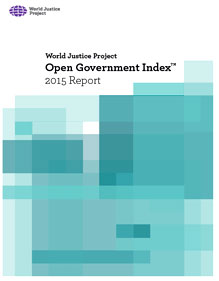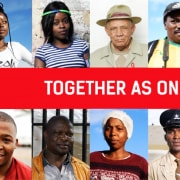|
Getting your Trinity Audio player ready...
|
 The World Justice Project (WJP), which works to advance the rule of law, recently launched its 2015 Open Government Index. This, says the organisation, is its first effort at measuring government openness around the world, and is based on ordinary people’s experiences and perceptions as they interact with their governments.
The World Justice Project (WJP), which works to advance the rule of law, recently launched its 2015 Open Government Index. This, says the organisation, is its first effort at measuring government openness around the world, and is based on ordinary people’s experiences and perceptions as they interact with their governments.
Openness, says WJP, is a necessary component of a system of government founded on the rule of law – because such a government is transparent, accessible, responsive, and participatory. It shares information willingly, empowers people with tools to hold its employees accountable, and fosters citizen participation in public policy deliberations.
By publishing the report, the WJP hopes to “enhance efforts to evaluate the extent to which countries provide official information to their citizens, encourage community involvement, and improve government responsiveness”.
The organisation also hopes to play a role in encouraging policy choices that enhance openness, promote effective public oversight, and increase collaboration amongst public and private sectors.
Wealthy males more likely to request govt information
The open government index (OGI) was scored from the data of 78 variables drawn from more than 100 000 household surveys and in-country expert questionnaires. This resulted in scores and rankings for 102 countries, based on four pillars.
- Publicised laws and government data relates to the accessibility of laws and government information without the need for citizen action.
- Right to information requires citizens to take a further step by actively approaching the government for information.
- Civic participation requires yet one additional step – citizens requesting governmental action, voicing concerns, or proposing solutions to problems that affect them.
- Complaint mechanisms constitutes a minimum condition necessary to ensure that citizens have an effective remedy to protect their legal rights.
The index scored countries between 0 and 1, with1 being the most open and 0 being the least open.
South Africa scored 0.62 on the index, with a global ranking of 27. In sub-Saharan Africa, South Africa ranked first, followed by Botswana, Ghana and Senegal. Sweden, New Zealand and Norway were the top three countries globally.
South Africa’s scores for each of the four pillars were within the top tercile – it was the only African country to achieve this. Its individual pillar scores were:
- 0.53 for publicised laws and government data – ranked 30 globally and 1 regionally.
- 0.60 for right to information – ranked 31 globally and 1 regionally.
- 0.70 for civic participation – ranked 29 globally and 5 regionally.
- 0.63 for complaint mechanisms – ranked 28 globally and 1 regionally.
Broadly speaking, the OGI report found that:
- worldwide, only 40% of survey respondents know of any laws supporting their right to access government-held information.
- in 80% of countries low-income respondents are less aware than high-income households of their right to information. In 68% of countries low-income respondents are less likely to request information from the government.
- in 76% of countries women are as likely as men to request information from a government agency. However, in half of all countries surveyed, women tend to be less aware than men of laws supporting their right to access government-held information.
This means that worldwide, people who are more educated, wealthier, and male are more likely to request and seek out government information than those who are less educated, poor, and female.
Open government and impunity
In countries that achieved higher OGI scores, WJP found the general perception to be that government officials are more likely to be punished for misconduct. In countries with lower scores, usually developing countries, this is not the case.
Open government is a central mechanism to promote accountability, says WJP, but open government alone may not be enough to combat impunity. Effective oversight agencies and the judicial system are also necessary to hold government officials accountable, as it is through these mechanisms that individuals are brought to book for violating the law.
South Africa scored a mediocre 0.50 in the sub-category of sanctions for official misconduct. This despite the fact that it is one of the eight founding members of the Open Government Partnership (OGP) – a community of governments that work together with civil society to become more open, accountable, and responsive.
Member states and civil society strive to produce an action plan, which is a set of commitments towards achieving open government. A new action plan can be implemented after two years. South Africa is in its second action plan cycle.
In its latest progress report, which may be downloaded from the OGP website, South Africa is described as having initially focused on improving service delivery, fighting corruption, and encouraging civic participation. It made eight commitments which would move it closer to these goals.
Of the eight commitments, four of the eight are on schedule, two are behind schedule and two are listed as unclear, with no measurable deadline.
The two commitments that are behind schedule are a feasibility study for the establishment of a single comprehensive, publicly accessible portal of environmental management information, and the approval of guidelines on sanctions for corruption related cases. The latter is important, the report reads, because “transparency will be enhanced in that the public will know the sanctions for corruption-related cases.”
That the corruption commitment is behind schedule will come as no surprise, and the progress report itself states that “No measurable activities were reported regarding implementation”.









